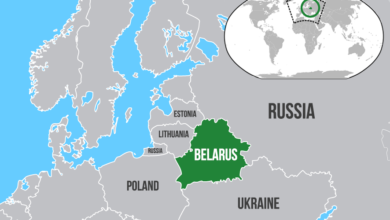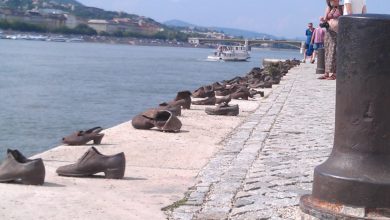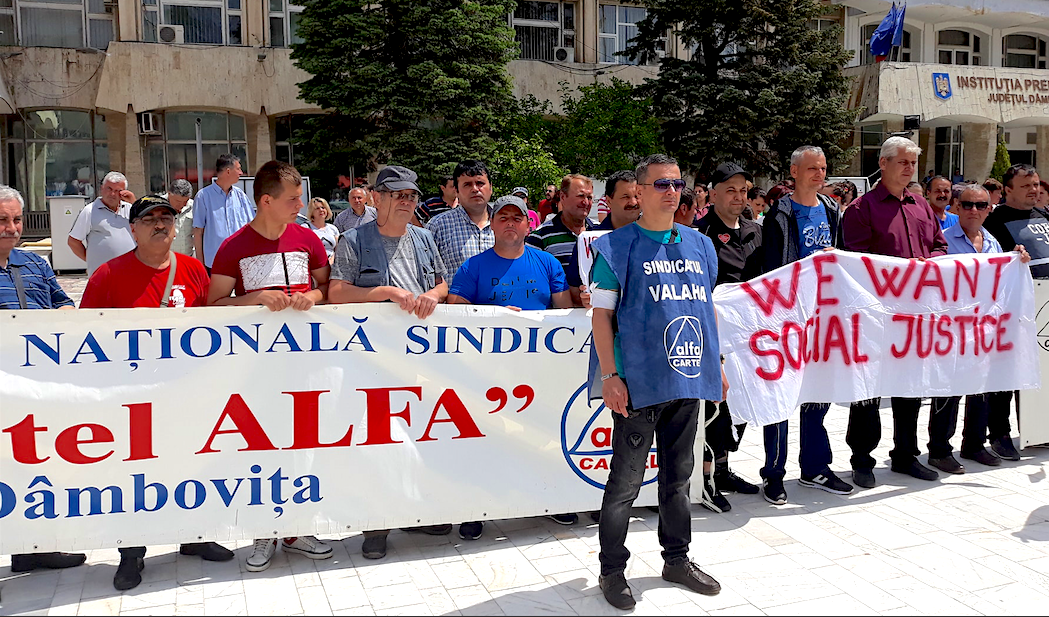“No sacrifices for the plutocracy, the oligarchy must pay for the crisis!” chanted tens of thousands of outraged Greek workers Nov. 7, demonstrating in torrential rain against the latest wave of devastating austerity. Separated from the crowd by suffocating clouds of tear gas, thousands of cops and—for the first time in Athens in decades—water cannons, the ruling-class politicians inside the parliament building narrowly approved yet another assault on the social rights of poor and working Greeks.
The austerity measures serve the dual purpose of boosting the profits of Greek capitalists and meeting the conditions to secure the next installment of bailout money from the Troika—the International Monetary Fund, European Central Bank and European Union. When the world economic crisis hit Europe, the Greek government entered an unprecedented financial crisis, teetering on the edge of bankruptcy due to the country’s massive public debt. If Greece defaults on its debt, it will likely have to leave the eurozone—the group of countries that use the euro currency—and return to its old currency, the drachma.
While ruling-class mouthpieces have blamed “lazy, spoiled” Greek workers for the debt in an attempt to dull international solidarity, the global crisis of capitalism, hitting Greece’s mainstay tourism and shipping industries especially hard, and the tradition of massive corruption and tax evasion by the Greek capitalist class are entirely responsible for the economic catastrophe.
To coincide with the vote on the new measures, the main trade unions GSEE and ADEDY, under pressure from the Communist-led All Workers Militant Front (PAME), called a two-day general strike that brought the country to a standstill. Transportation and electrical workers took even more extensive strike action that continued past Nov. 7, while several organizations of professionals also withheld their labor in the run-up to the national shutdown. On each day of the general strike, tens of thousands of workers marched to Syntagma Square in central Athens in a massive show of class consciousness and militancy.
Another mass demonstration was held on Nov. 11 as parliament voted to approve the 2013 budget, which contained massive cuts to spending on vital social services. Lawyers and judges decided to extend their strikes to Nov. 16 and 21, respectively, while pharmacists announced strikes on Nov. 26 and 27. A three-hour general strike took place on Nov. 14 as part of a Europe-wide day of action by organized labor.
Prior to the Nov. 6 and 7 general strike, workers shut down the country on Oct. 18 as politicians were negotiating the specifics of the new austerity package. During the demonstration Xenofontas Lougharis, an unemployed dockworker who participated in the march led by PAME, died of a heart attack aggravated by tear gas inhalation, and a 15-year-old boy was beaten by the hated MAT riot police.
This repression came roughly a week after 50,000 Greeks protested German Chancellor Angela Merkel when she made a surprise trip to Athens. Germany is the eurozone’s largest economy and Greece’s most important creditor. Merkel has taken a hard line toward bailout funding, demanding round after round of crippling austerity, and is one of the most widely despised figures in Greece.
Despite this outpouring of militancy, Prime Minister Antonis Samaras was still able to put together a thin majority—153 out of 300 members of Parliament—and pass the $17.5 billion austerity plan. As a result, many pensions will be cut by 25 percent, the retirement age will increase from 65 to 67, public workers will endure pay cuts, regressive consumer taxes will rise, and a range of other gains won by working people will be rolled back.
In addition, many professions were targeted for “liberalization”: taking away workers’ rights to regulate their own profession and allowing capitalists to make those decisions instead. Jobs related to tourism, health care, transportation and other important areas of the economy were selected in an attempt to guarantee an acceptable rate of profit in those sectors, with special emphasis on attracting foreign capital.
Ruling coalition begins to crumble
Squeezed between the tremendous weights of the organized working class on the one hand and the financial and diplomatic leverage of the Troika on the other, serious cracks emerged in the ruling coalition supporting the prime minister’s government. The coalition includes Samaras’ right-wing New Democracy party, the misnamed Pan-Hellenic Socialist Movement (PASOK) and Democratic Left—a right-wing split from the main opposition Coalition of the Radical Left (Syriza). Only four months after taking power, the margin by which the ruling coalition commands a majority in Parliament has been cut in half.
Perhaps the most serious blow to the stability of the government came from Democratic Left’s decision to abstain from the vote on the austerity package. Although the party accepted the attacks on social services, pensions, and so on, it was unwilling to openly support the labor market liberalizations that more directly targeted its social base: professionals and the better-off layers of the working class. However, two Democratic Left members of Parliament went against the party’s decision and voted against the austerity measures as well as the 2013 budget, and might subsequently leave or be expelled from the party.
PASOK, the second largest party in the coalition behind New Democracy, suffered the most serious internal crisis of the three partners, losing a fifth of its parliamentary delegation. Six members of PASOK voted against the austerity package and were expelled from the party, and a seventh defected the day after the vote.
PASOK is also still reeling from the “Lagarde List” scandal. It was recently revealed that then French finance minister and now IMF Managing Director Christine Lagarde gave then Greek finance minister and current PASOK leader Evangelos Venizelos a list of 2,000 names of suspected tax evaders. Venizelos, having no desire to make these wealthy individuals shoulder even part of the burden of the economic crisis, ignored this information and went on pushing for harsh austerity.
PASOK was formed after the overthrow of the U.S.-backed military dictatorship in the 1970s as a vehicle to unite all non-revolutionary socialists under the banner of social democracy: a “kinder, gentler” capitalism. Having lost all legitimacy and with its political niche usurped by Syriza, there is open speculation about whether the once-dominant party should even continue to exist. A critical PASOK congress in February will likely see a strong challenge to the leadership of Venizelos and even more parliamentary defections that will further weaken the coalition government.
Only one New Democracy member of Parliament defected during the vote on the austerity measures, and there were few outward indications of dissent within its ranks. However, there is a long-standing division between the liberal wing of the party and the “popular right” faction. Popular Right is generally more skeptical towards the Troika from a bourgeois nationalist perspective. Should the government continue its policy of absolute submission to its international creditors, there is a possibility that New Democracy could fracture.
On the other side of the aisle, the largest opposition force is Syriza. Syriza is composed of the Coalition of Left Movements and Ecology (Synaspismos), a reformist grouping that left the Communist Party of Greece after the Soviet Union was overthrown, and several smaller, communist tendencies, mostly from the Trotskyist or Maoist traditions. Former members of PASOK and other bourgeois parliamentary parties have recently been integrated into the leadership as well. The coalition experienced a meteoric increase in popularity over the last year under the charismatic leadership of Alexis Tsipras, who promised to cancel the austerity measures and stand up to the Troika.
Despite the acclaim it enjoys among some sections of the left, Syriza’s leadership promotes fundamentally social democratic politics. The majority of its member parties are silent on the need for the socialist reorganization of society, and the solution it proposes to the economic crisis is to convene a “European debt conference” to approve a “Marshall Plan” to relieve Greece of its financial burden. In recent days, it has worked closely with the right-wing populist Independent Greeks party, which is now Syriza’s presumed coalition partner should it win the next election.
Tsipras recently described his coalition as “the last fortress defending social cohesion and democracy in Greece.” But there can be no cohesion in a society divided between exploiters and exploited. Tsipras is in fact pledging to reform capitalism in order to save it.
The rightward drift of Syriza has caused serious internal disputes, and the left-wing factions have raised principled objections to Tsipras’ increasingly strident social democratic line. The revolutionary tendencies within Syriza, however, find themselves trapped by the organizational form of the coalition, a big-tent “left regroupment” formation that has no discipline around a party line. Without unity on the most basic question of which class should rule, it is highly unlikely for such an organization to take advantage of a revolutionary crisis and lead poor and working people to power.
The Communist Party of Greece (KKE), by contrast, explicitly calls for revolution to establish “workers’ and people’s power” and to socialize the major means of production. In the mass movement, it raises the slogan “Worker, without you no cog can turn, you can do without the bosses!” Its press takes special aim at Syriza, accusing it of misleading poor and working people and spreading illusions about reforming capitalism.
However, the KKE experienced a significant drop in support as Syriza rose to replace it as the largest force on the left. The Communists are holding a crucial party congress in March, where delegates will assess its work over this last period of struggle and elect a new leader. Many KKE cadre are hopeful that this will be an opportunity to regain the initiative by adopting a more open approach to work in mass movements and uniting with like-minded forces to fight for revolutionary change.
Casting a shadow over the progressive and revolutionary opposition to austerity, the Nazi-styled Golden Dawn party is rapidly gaining strength. It now consistently polls as the third most popular political party in Greece (behind Syriza and New Democracy) and regularly engages in acts of racist violence directed against immigrants.
Golden Dawn receives important support from strategic sections of the capitalist establishment. It has a major base of support among members of the police force, and the Greek Orthodox Church is undergoing a sharp internal struggle over whether or not to support it. Politically and physically smashing fascism is now a more pressing task than ever for the left.
Troika considers its next steps
In October, international banking giant Citigroup revised its prediction about Greece’s future in the eurozone. While it had projected a 90 percent chance of a default and return to the drachma, it now assigns this scenario a 60 percent probability. This is likely a good indication of the general attitude of the European ruling class: It would be best if Greece stuck with the euro, but the situation is probably not salvageable. This position is now even articulated openly by eurozone politicians like Swedish Finance Minister Anders Borg, who suggested the day after Citigroup revised its predication that Greece would be better off in the long run if it abandoned the common currency.
With many considering a Greek default an eventuality, the Troika increasingly finds itself paralyzed by inter-imperialist rivalries. For its current bailout plan to work, Greece would have to return to economic growth in 2014 and meet a set of impossible targets for deficit reduction, privatizations and tax collection with the goal of reducing its public debt to 120 percent of GDP by 2020. High-ranking European officials recently estimated that it will in reality end up at 150 percent under current circumstances. Drastic action, and a tremendous amount of money, is needed to put the recovery plan in line with reality, but the Troika is becoming stymied by internal divisions.
Nevertheless, frantic efforts are still being made to deal with the debt crisis and restructure the eurozone to reconcile the more financially stable northern European “core” with the peripheral so-called “PIIGS” countries: Portugal, Ireland, Italy, Spain, and of course Greece. This fantasy land where the contradictions of capitalism are overcome by the skillful maneuvering of technocrats is referred to in European policy-making circles as “Genuine Economic and Monetary Union.”
The most hard-line grouping, led by Germany, wants GEMU to be achieved without the stronger economies taking on liability for the periphery’s debt. Others support the introduction of “Eurobonds,” joint-debt issued by the European Central Bank that would allow peripheral states to take advantage of the good credit of the core countries. French President Francois Hollande supported Eurobonds during his election campaign, but this drastic measure would mean lifting the ban on direct financing of eurozone governments by the ECB—a near sacred provision in the eyes of the German capitalist class.
Despite this disunity, it appears that the Troika will agree to a two-year extension for Greece, giving it until 2016 rather than 2014 to make the progress required for its reentry into private bond markets. With unemployment over 25 percent and a new raft of austerity measures about to exacerbate the economic crisis, it is unlikely that even this extended timeframe will be sufficient. Furthermore, the two-year extension will cost an estimated 30 billion euros, and the actual financier of this amount is still yet to be determined.
The only seemingly serious option on the table is a plan referred to as “Official Sector Involvement.” After private banks wrote off much of the value of their Greek bonds as part of the second bailout package earlier this year, a major part of the country’s debt is now held by the central banks of other eurozone countries and the ECB itself. OSI would have these financial institutions also take a voluntary loss on their Greek bond holdings.
The International Monetary Fund is sympathetic to the idea of OSI and is generally taking more of a harsh realist approach to the European debt crisis. However, the debt write-off is vehemently opposed by Germany, which again invokes the taboo on direct funding by the ECB.
Should the Troika overcome this paralysis and unify around a plan of action for Greece, it will likely come with strict “conditionality”—more austerity. Considering the weakened state of Samaras’ government, parliamentary approval of a new deal of this type and the survival of his coalition would be in serious question.
In the coming days and weeks, the capitalist class will attempt to perpetrate the same blackmail on the poor and working people of the United States as they have on the people of Greece. Massive cuts to vital social services like Social Security and Medicare will be proposed in order to avoid falling off the dreaded “fiscal cliff.” The Democrats will likely engage in progressive posturing, but both capitalist parties are united around the goal of forcing the working class to bear the burden of the economic crisis.
Struggle is the only available avenue to prevent this looming social catastrophe. The persistence and militancy of the Greek people serves as an important model as the people’s movements in the United States enter this new situation. In the coming period, we will be united with our Greek sisters and brothers through both our common struggle and ultimately through the revolutionary aspirations of our class.






